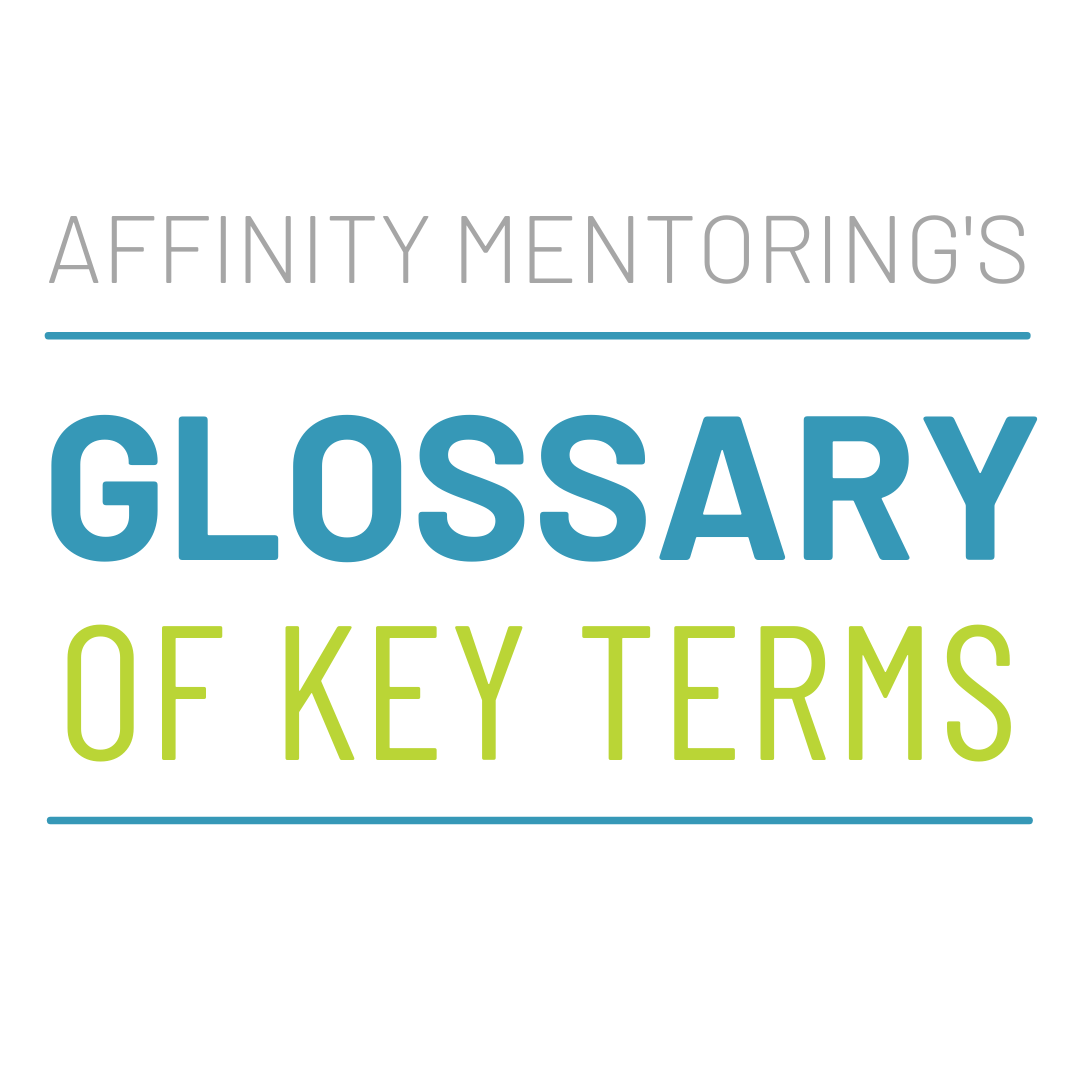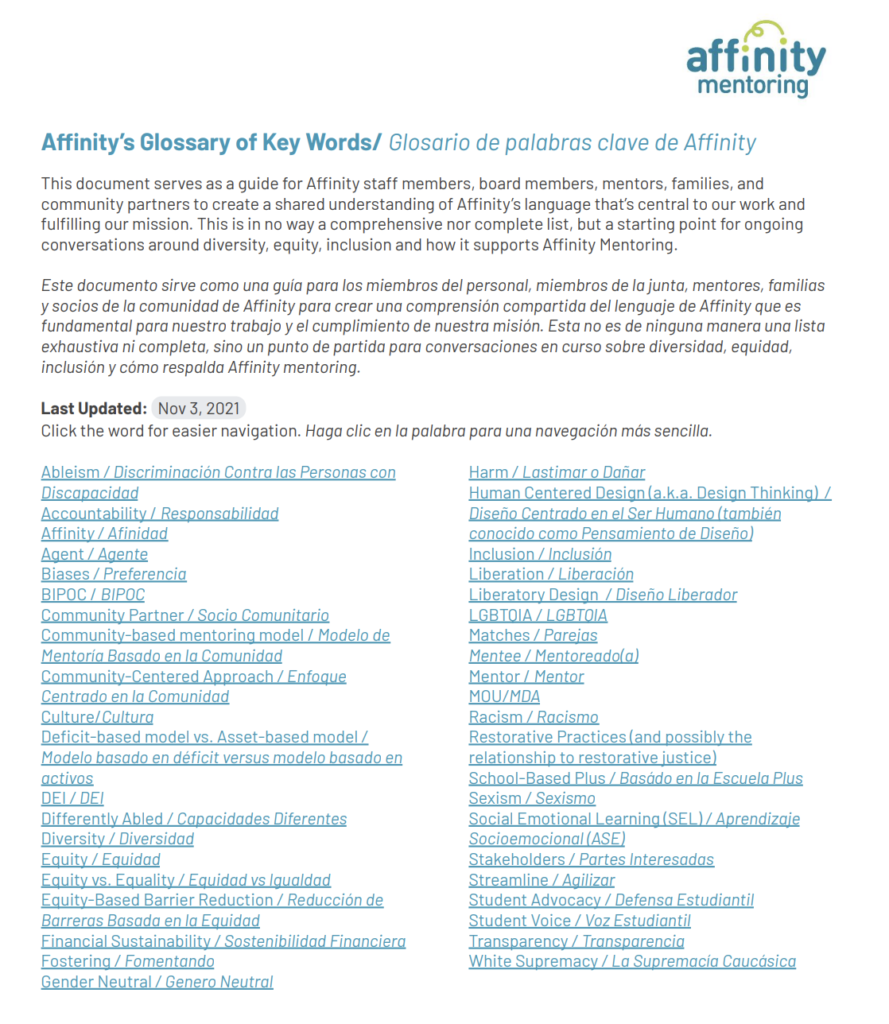May 11, 2022 | By Cassandra Kiger
As part of our 2021 Community Listening Project we asked the public if we should provide extra training for mentors related to diversity, equity, and inclusion topics specific to mentoring. Ninety-two percent of respondents said that it was either important, or very important for our organization to provide this (page 4), so we complied!
If you’re not completely sure how putting time and resources into DEI work relates to mentoring, and us fulfilling our mission and vision for Affinity, we love learning with you! Check out the extensive research we have been conducting to make sure we facilitate amazing mentoring in this recent blog. We are grateful for the Steelcase Foundation whose grant has made it possible for this training to be free and widely available for AM partners, staff, mentors, and board members.
Anti-Racism Training Series
In February, March, and April of 2022 Affinity Mentoring facilitated a three tiered training (levels 101, 201, and a community panel) focused on Anti-Racism in Education and Mentoring. We had 71 total attendees at these three, free training sessions, in addition to three expert trainers and 5 panelists.
DEI 101 Training: Our trainers included Vanessa Jimenez, Founder/CEO of Mezcla Mosaic Collaborative and Marlene Kowalski-Braun, GVSU Associate Vice President for Enrollment Development Deputy Inclusion and Equity Officer for our 101 training. They facilitated a brave, healthy, inquisitive space for individuals to begin thinking about how other’s racial life experiences might be different from our own, and why it matters in education and mentoring. They invited participants to engage in critical reflection about foundations of DEI work, including defining diversity, equity, inclusion, and intersectionality both personally and organizationally. They helped participants develop an understanding of social identity, white supremacy, implicit bias, and microaggressions and how they shape a person’s experience of power, privilege, and oppression both individually and organizationally. Lastly, we discussed our personal and collective responsibility to keep ourselves and each other accountable to anti-racist work, especially in mentoring.
DEI 201 Training: Christine Mwangi, CEO and Founder of Grounded In Equity, President and CEO of Be A Rose, member of the Affinity Mentoring Board of Directors, and KDL Director of Fund Development, led our 201 training. We dove deeper together into how race impacts education in our community, and the individual and community-level steps that we can take to support all students succeeding. Christine helped us define and understand specific terms and ideas when discussing the racial achievement gap in our local schools, including redlining and its lasting effects on school systems. We discussed systemic outcomes that disproportionately affect students of color within the academic sector, and how individuals can help make a positive impact through interactions with students and mentees. Below are a list of excellent video resources that Christine shared with us.
Videos:
- Explained: Racism Wealth Gap
- How America’s Public Schools Keep Kids in Poverty
- Because I’m Latino, I Can’t Have Money? Kids On Race
- Critical Mentoring: Because Young People Deserve the Best of Us
DEI 301 Training: Our third training for this year was actually a panel discussion with local experts on DEI, education, and mentoring who helped us take the things we learned in our previous two trainings, and understand them more fully in Grand Rapids and Wyoming. Our panel included Kyle Lim of the Urban Core Collective, Rafael Castanon of Health Net of West Michigan (and AM mentor), Alex Kuiper of Godfrey-Lee Public Schools, Brandy Lovelady Mitchell of the Michigan Education Association, and Erika VanDyke of the Urban Core Collective (and an AM mentor).
Mentors, staff, and partners were invited to submit questions to the panel ahead of time. Some of our key questions and take always from the nearly two hours of discussion included:
- We learned about institutional racism, redlining, and other systems that make racism a part of our schools. Sometimes it feels like the problems are so big that there is very little we can do about them. Is that true?
- Panelist responses: We need to remember that progress is not linear, and we need to adapt to changes so that we keep moving forward. Racism is meant to exhaust and paralyze use; when issues are this complex, remember to focus on students, families, and communities and their needs. The work is worth it, because racism continues to hurt real people, and we cannot move at the same pace that the resistance is moving; we have to work faster if we actually want to make change. We need to imagine the future we want to live in and begin shaping it, even if we can’t fully see it yet. Never forget that system level change can start with voting! Vote for people who will make the changes you want to see.
- Is there any work being done already in Grand Rapids to help make our schools anti-racist?
- Panelist responses: Challenge your school board and the schools executive cabinet to make sure that they are engaging in real DEI work! You can send them letters, and attend school board meetings (even if you don’t have students attending that school), and the Urban Core Collective can help you prepare letters and statements; they are also helping to organize parents/caregivers, and you can contact betsaida@uccgr.org if you want to participate.
- What are ways that we can start conversations about race with children and students without scaring them?
- Panelist responses: Let discussions be organic and student-led, and never engage in conversations with your mentee because you want to, but let them lead so that you don’t cause extra harm. Acknowledge when you don’t know the answer. You can discover the answer alongside students and mentees, and even ask your Affinity Site Coordinator to help you find resources to do that.
- Always validate student emotions and feelings, and ask them open-ended questions, and provide them with clarifying statements to help them process their own thoughts and feelings. Model to them by doing your own mirror work and showing them that it is healthy to learn new things.
- Mentors: what is something that you have learned about your mentee’s culture from mentoring?
- Panelist (and attendee) answers: Find out what your mentee is passionate about, and let that lead your conversations and learning! As they get more comfortable, they will be excited to share, and feel safe to share more intimate information, like their culture, with you.
- How can we encourage mentees to embrace their own culture?
- Panelist answers: Model this behavior to your mentees by talking about your own life experiences and culture, and then inviting your mentee into the conversation.
- Use diverse books and resources in the mentor centers to talk about different cultures, and find resources that match your mentee’s culture and invite them to be proud about it.
- Make sure to connect the micro level work with the macro level work; we won’t need to help students “rediscover” or share their cultures and experiences if we fight against the systems that make it hard for them to share those things naturally. By improving the whole system, we make this easier and healthier for each student!
DEI and Anti-Racism Resources
Some resources and reading that panelists recommended included:
Lastly, we were able to share some resources with all of our participants that Affinity Mentoring has been developing to help give mentors and partners more resources to continue learning and growing together with each other and their mentees. We highly encourage you to check out and use these resources, and talk to your Affinity Mentoring team members for more learning opportunities!
- Anti racism, Identity Development, and Mentoring Resource Page by Lauren Enos
- Mentor Resource FB Page
- Monthly Newsletters
- Affinity DEI Page
- Affinity Glossary
2022 Community Listening Project
As we close out this 2021-2022 mentoring year, we will be publishing our full 2022 Community Listening Project results showing that:
- 85.2% of respondents tell us that it is very important or important that we “publicly support groups of people who are dismissed or unsafe in our community”,
- 85.9% of respondents tell us that it is very important or important that we put time and resources into “finding more diverse mentors”, and
- 80.8% of respondents tell us that it is very important or important that we “provide yearly diversity training for mentors”.
Based on this, and the overwhelmingly positive attendance and feedback from this year’s trainings, we will continue to provide new training series each year, giving mentors and partners opportunities to learn about key areas of identity development for students, and how it relates to creating and maintaining an amazing mentoring program with short and long term student benefits. Our 2022-2023 mentoring year DEI training topics will focus on gender identity and sexual orientation. We promise to continue listening to you and your needs, and making decisions for our programming based on the most up to date, peer-reviewed research on how to support students and fulfill the mission and vision of Affinity Mentoring to the best of our ability.

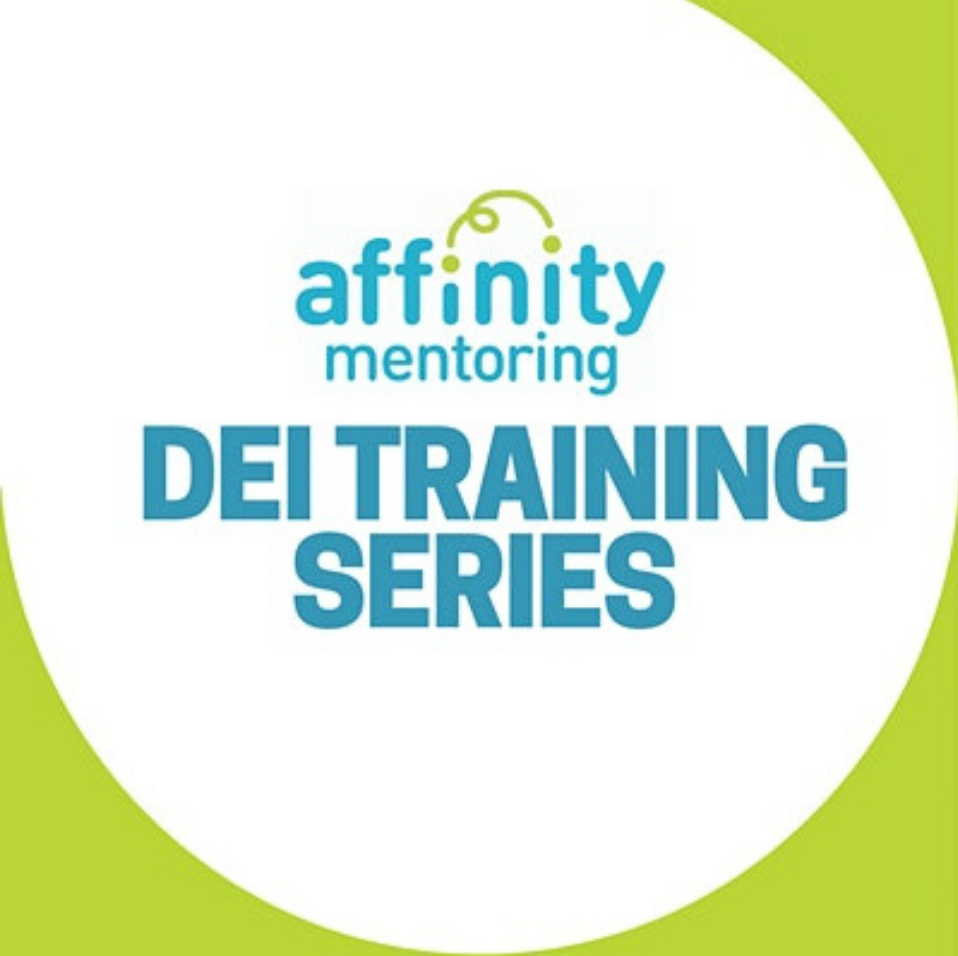
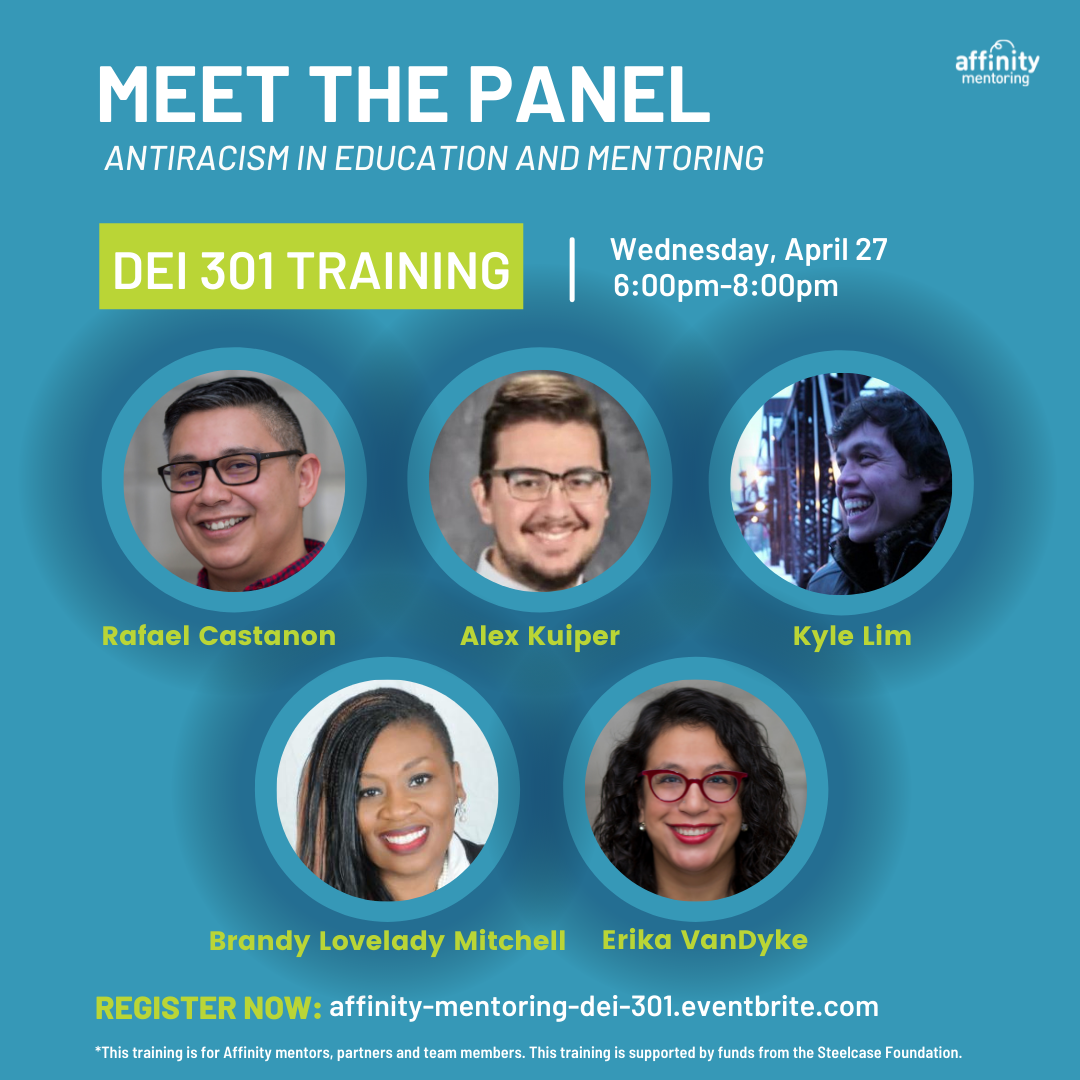
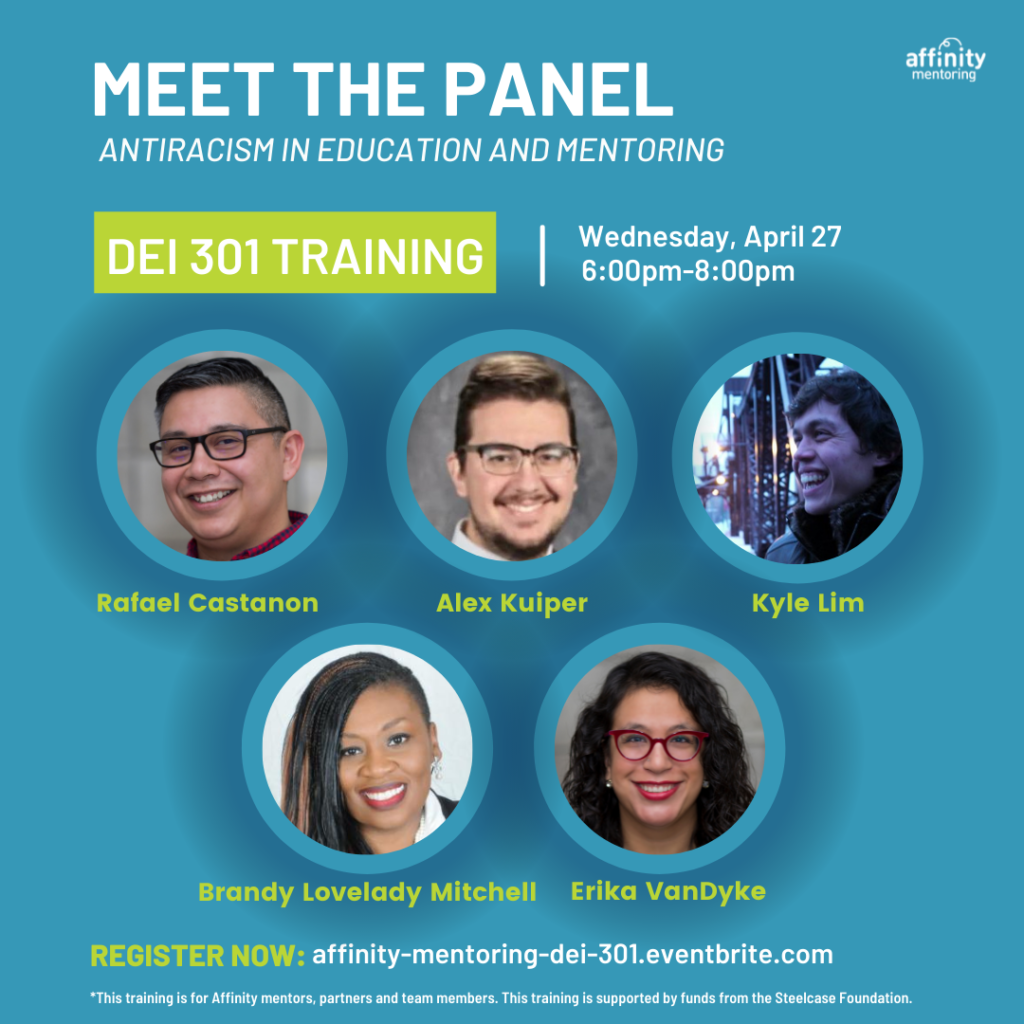
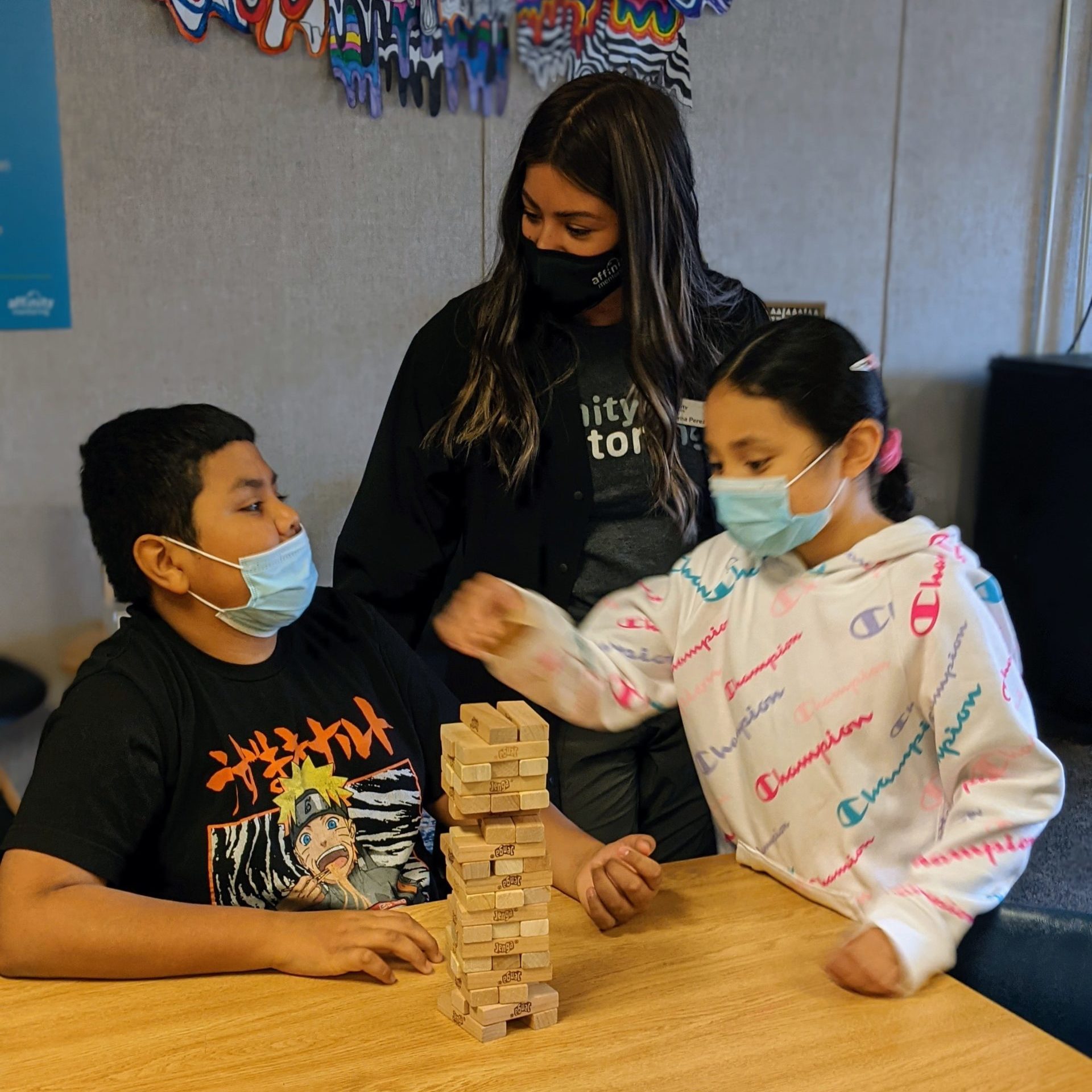
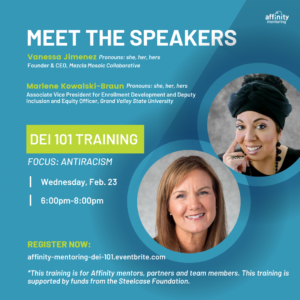 DEI 101
DEI 101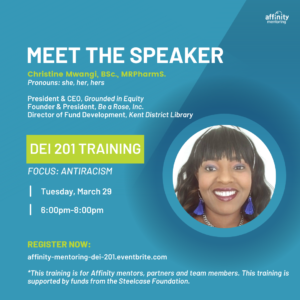 DEI 201
DEI 201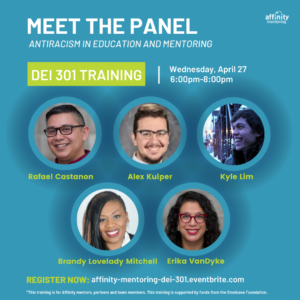 DEI 301
DEI 301